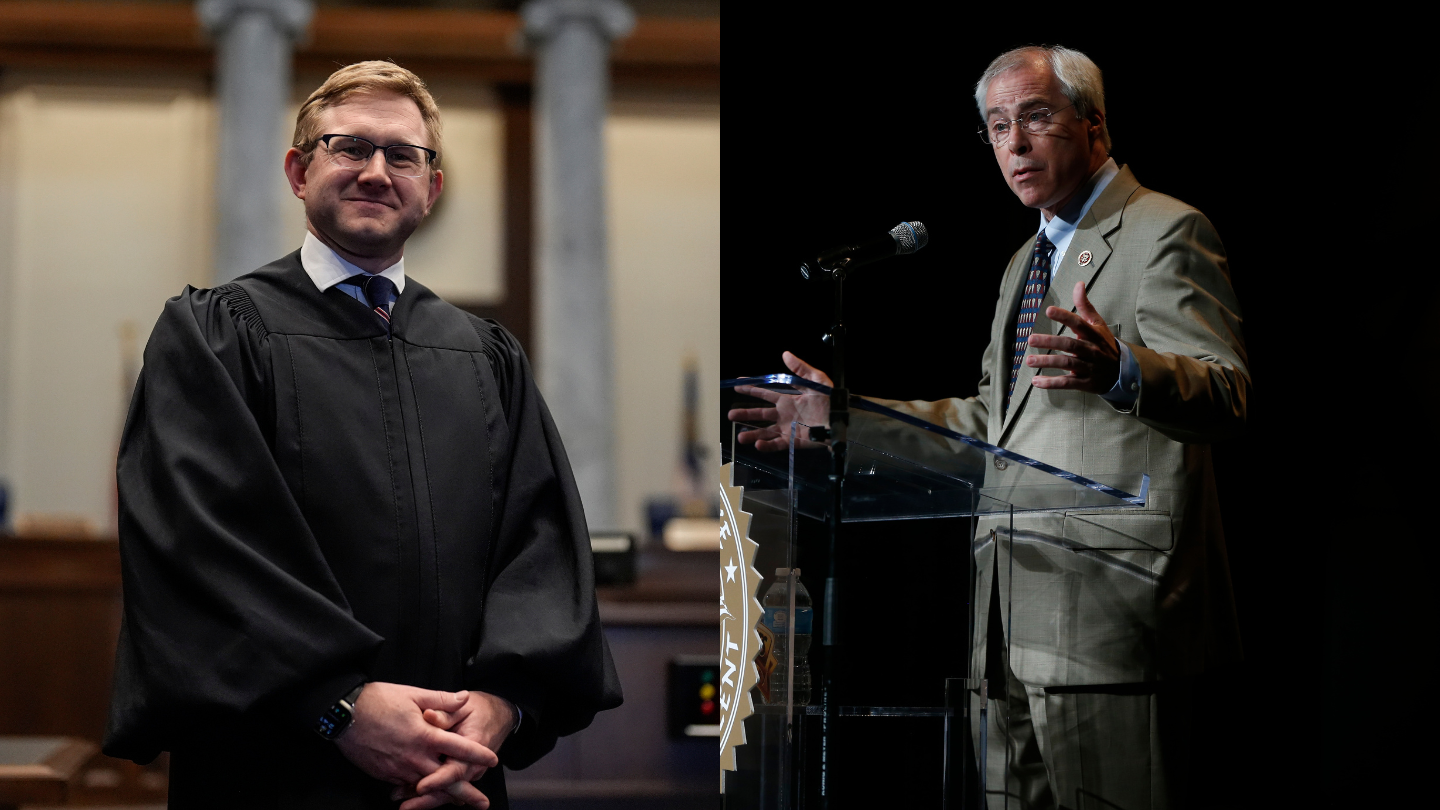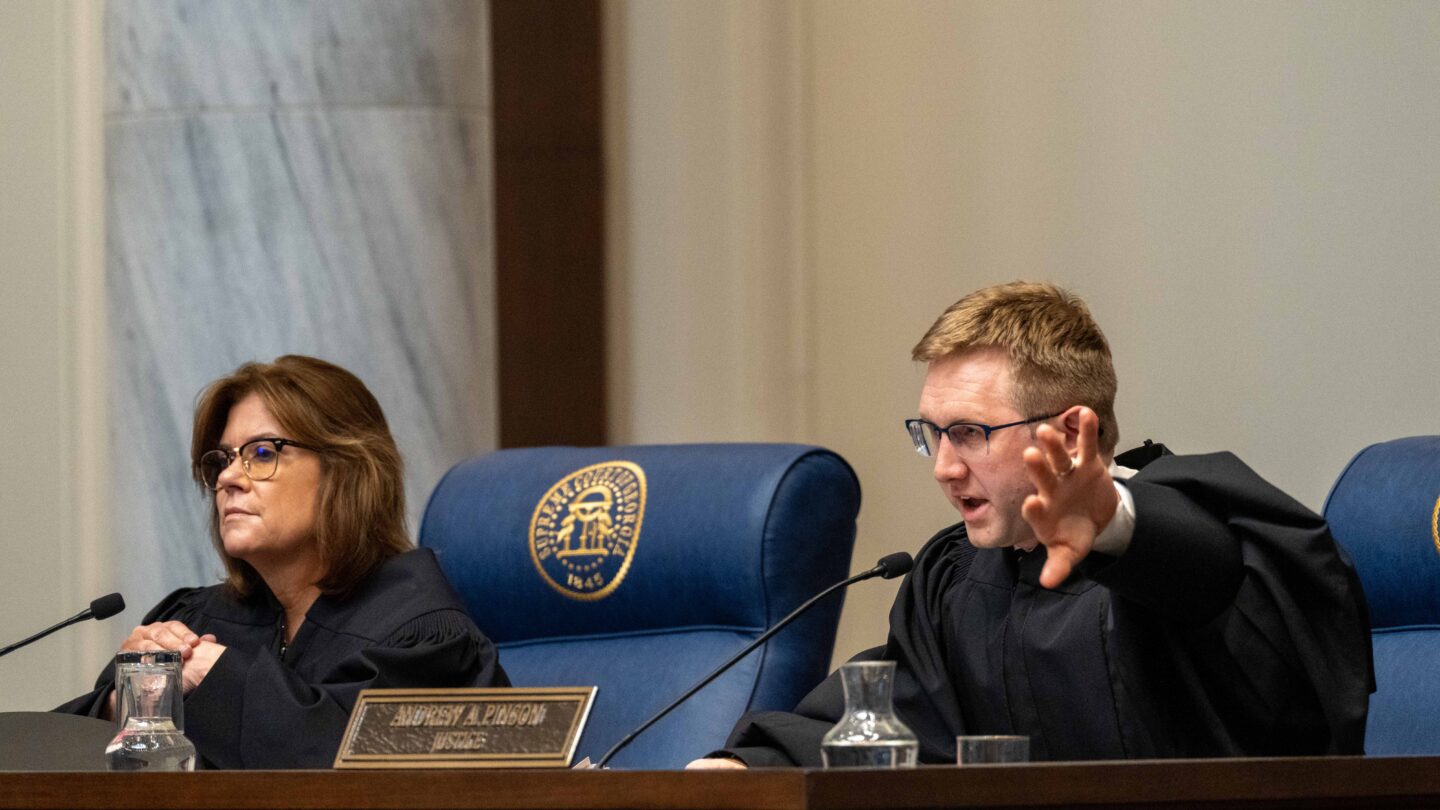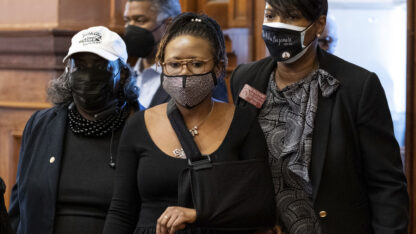Abortion takes center stage in hotly contested Georgia Supreme Court race

Updated May 21 at 7:18 p.m.
Former Democratic U.S. Rep. John Barrow is running against incumbent Justice Andrew Pinson in the Georgia Supreme Court race. Barrow’s campaign is centered on protecting women’s reproductive rights, but his outspokenness on the issue has led him into a legal battle ahead of the May 21 general election.
Barrow filed a federal lawsuit alleging that judicial codes regulating campaigns violate his First Amendment right to free speech. The lawsuit raises questions about whether or not judicial candidates should share personal opinions on controversial topics or state how they’d rule on cases if elected.
A federal judge on Thursday rejected the lawsuit, ruling that Barrow didn’t have standing to sue because he chose to release a confidential letter from the Georgia Judicial Qualifications Commission and because his continued public speech isn’t being restricted.
Following a trial hearing on Monday, Barrow said he’s fighting for his right to speak up for women’s rights.
“I was in court because my opponents are trying to silence me by threatening to sanction me for having the nerve to talk about what this election is all about. If I can’t talk about what this election is all about — then what’s the point of an election?” Barrow told WABE in a statement.
Georgia Supreme Court justices face nonpartisan elections at the end of each six-year term. In contested races — which are uncommon — incumbents nearly always win.
According to UGA political science professor Charles Bullock, the last time an incumbent Georgia Supreme Court justice lost was in 1922 when Richard B. Russell Sr., father of Georgia Governor and U.S. Sen. Richard B. Russell Jr., beat Justice William Fish.
It’s a critical election year, and Georgia is at the center of it. Stay in the know with WABE’s 2024 Georgia Elections page, where you can find WABE’s latest election news and podcast episodes, important dates, voting locations, candidate info, results and more.
Historically, contested races have been apolitical. But Barrow’s campaign has thrust abortion into the spotlight. Some say it opened the door for partisan politics to take over the race. And it’s a strategy that critics and the legal establishment say is unethical.
“Unfortunately, John Barrow has decided to ignore Georgia’s judicial ethics code. His lawsuit makes clear that his goal is to negatively politicize judicial races and destroy Georgians’ trust in fair and impartial courts,” a spokesperson for Pinson said in a statement to WABE.
A judicial ethics complaint outlines seven instances where it says Barrow violated its code. One of the alleged violations is this statement on his website:
“I’m running because we need Justices on the Georgia Supreme Court who will protect the right of women and their families to make the most personal family and health care decisions they’ll ever make. Despite many fine qualities, it’s obvious from his record that the incumbent, Justice Pinson, cannot be counted on to do that.”
Other complaints target a campaign commercial and Facebook posts.
In a statement, Barrow argued that his views on abortion are legal, not partisan or political. He said women have the same rights under Georgia’s Constitution today as they did before Roe v. Wade was overturned. He also cited a U.S. Supreme Court ruling that protects the right of judicial candidates to speak their mind on controversial matters, including ones that might be heard by the court.

Who are the candidates?
John Barrow previously served as a Democratic congressman for Georgia from 2005-2015. According to his website, he worked as a pro bono attorney in the years after and has experience as a private practice lawyer.
This is the fourth time Barrow has tried to run for a seat on the state Supreme Court since 2020, a campaign spokesperson said. But this is the first time he’s on the ballot. He’s repeatedly gone up against a judicial system that favors governor appointments over electing new justices.
Pinson, the newest justice, was appointed by Republican Gov. Brian Kemp in 2022. He previously served as a judge of the Georgia Court of Appeals and as Georgia’s solicitor general from 2018-2021. Before that, he worked at a private practice and clerked for federal judges, including U.S. Supreme Court Justice Clarence Thomas.
When the state Supreme Court upheld Georgia’s six-week abortion ban last fall, Pinson did not participate in the case.
Though Pinson has been silent about abortion and other issues, Barrow has characterized him as someone who won’t fight for women’s rights. On Barrow’s website, he calls out Pinson for supporting Mississippi and Alabama in the case that led to the overturning of Roe v. Wade. Pinson was the solicitor general at the time.
Judicial elections post-Roe
Barrow’s campaign is indicative of the growing presence of politics in the judicial system. As for abortion becoming a major factor, a turning point came when the U.S. Supreme Court overturned Roe v. Wade in 2022, allowing states to enact their own bans on abortions.
On May 6, a group of over a dozen former state Supreme Court justices and members of the legal community released a letter warning about the dangers of a “partisan campaign.” They called this race an opportunity for voters to “demand that our judges be nonpartisan and refrain from making public commitments about how they will decide cases and issues.”
In a response, Barrow questioned how voters can have confidence in who they’re voting for if candidates don’t say what they stand for.
“On the other hand, if judicial candidates do say what they stand for, the voters will have a better idea of what they are voting for,” he said.
Barrow’s outspokenness has led abortion-related interested groups to enter the conversation. The Georgia Life Alliance, a pro-life organization, is working to educate voters on where each candidate stands on abortion. But Claire Bartlett, its executive director, is more concerned with the judiciary becoming politicized.
“This is more about Barrow’s actions and a problematic trend that we’re seeing in American politics where the left wants to politicize the judicial branch, and that is outside of … both the state and federal Constitution.”
On the other hand, Barrow has stated that the Georgia Code of Judicial Conduct doesn’t prohibit judicial candidates from stating personal views.
A spokesperson for Planned Parenthood Southeast Advocates, Jaylen Black, highlighted the perceived upside of knowing where judicial candidates stand.
“With this race, with John Barrow [and] his victory, we will have someone on the court that we know stands firm in the efforts to make sure that we ratify what happened from Roe v. Wade being overturned,” Black said.
“Having someone to sit on this court … who has a value of protecting our access will be monumental for the work that we do,” Black said.
Early voting is ongoing and continues through May 17. Election Day for primaries and nonpartisan races such as the Barrow-Pinson matchup is on May 21.
Correction: This story cited an AJC article claiming the last time a challenger unseated an incumbent for the Georgia Supreme Court was before the Civil War. It was actually in 1922 when Richard B. Russell Sr. beat Justice William Fish.









